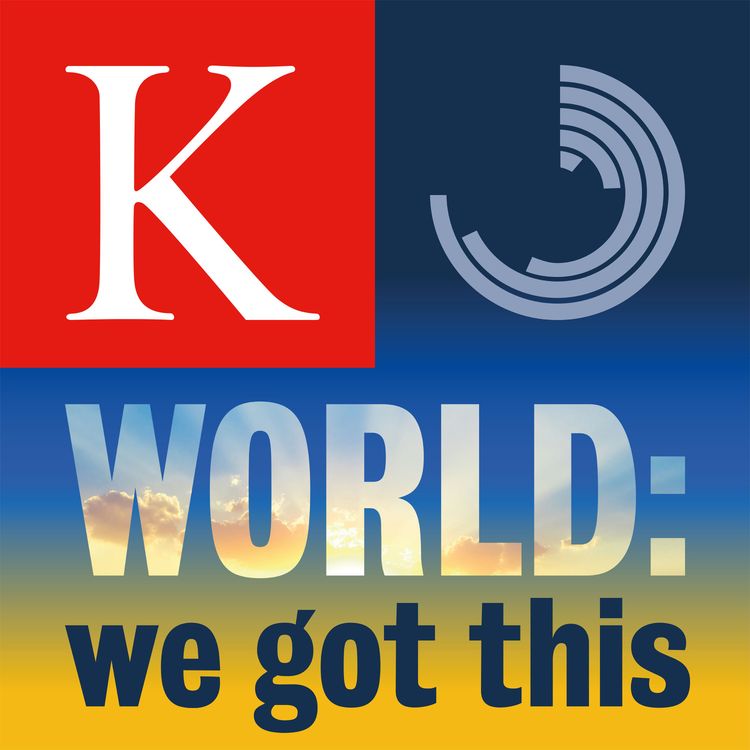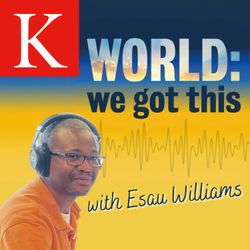Share

WORLD: we got this with Esau Williams
In conversation about the war on drugs in Guatemala
Season 3, Ep. 12
•
With the mass incarceration of women quintupling in Guatemala as a result of the 'war on drugs', Gloriana Rodriguez Alvarez, PhD candidate and human rights advocate, asks how the country's policies and institutions perpetuate social prejudices and impact marginalised communities.
In this episode, Gloriana speaks with David Mwambari, Lecturer in African Security and Leadership Studies at King’s African Leadership Centre, about her research, her time interviewing inmates in Guatemalan prisons and the importance of being an empathetic researcher.
More episodes
View all episodes

6. A Deep Dive into DeepSeek
40:21||Season 6, Ep. 6What is the new app DeepSeek? How does it differ from other LLM providers? And why has it caused such a significant impact on the US AI industry? In this episode, Esau is joined by Sean Starrs and Juan Grigera, from the Department of International Development, King's College London to discuss all things AI.
5. Forty years on from Band Aid, what is the UK-Africa relationship? And what happened at COP29?
01:00:46||Season 6, Ep. 5As the 40th anniversary version of 'Do They Know It's Christmas?' hits the charts, and with Ed Sheeran igniting a row over whether it and similar charity initiatives reinforce African poverty stereotypes, Esau and guests discuss the current state of the UK-African relationship. Plus, what the heck happened in Baku, as COP29 negotiations overran and left many feeling let down? Is the developing nations settlement too little too late?
4. What Trump 2.0 means for Ukraine, India, China and the world
34:12||Season 6, Ep. 4Donald J Trump is set to make a historic comeback as the 47th US President after a decisive electoral victory over Democratic candidate Kamala Harris. In this episode, host Esau Williams talks to Dr Sean Starrs, an expert in international development, and Dr Anastasia Piliavsky, a Ukrainian who studies Indian politics, on what to expect when Trump takes office in January 2025. They discuss the implications of a Trump presidency for India, Ukraine, China, the Middle East, and the rest of the world, and how Trump's MAGA base may influence his policies.
3. Should we super tax the super rich? And what happened at the BRICS+summit
39:56||Season 6, Ep. 3In the wake of the UK budget, and a report from Greenpeace on the feasibility of a wealth tax on the super rich, the panel discuss whether such a measure is possible or even likely. Plus, what happened at the BRICS+ summit, and was it a success for Putin and his allies?Joining Esau this episode are Sean Kenji Starrs, Barnaby Dye, and Benjamin Tippet from the Department of International Development.World: We Got This is brought to you by the School of Global Affairs, King's College London.
2. Spotlight on China – SEZs in Africa, China’s ghost cities and China in the US elections
41:47||Season 6, Ep. 2In this special episode for the Lau China Institute’s China Week, Esau is joined by Dr Charlotte Goodburn to discuss her new report on the impact of China-linked economic development zones in Africa, Dr Jane Hayward explains China’s many vacant cities, and Professor Astrid Nordin and Dr Sean Kenji-Starrs discuss the China question in the US elections. Learn more about the Lau China Institute's China Week: https://www.kcl.ac.uk/china-weekRead about the new report on China-linked SEZs in Africa co-authored by Dr Charlotte Goodburn: https://www.kcl.ac.uk/news/impacts-of-china-associated-economic-development-zones-in-africaLearn more about the School of Global Affairs: https://www.kcl.ac.uk/global-affairs
1. Nuclear energy; Modi in US; September flooding
26:34||Season 6, Ep. 1With Esau this episode: Prof Frans Berkhout talks about the pledge by the big banks to triple nuclear energy by 2050; Dr Anastasia Piliavsky digs deeper into Narendra Modi's visit to the US; and PhD candidate Teyah Payne discusses recent flooding in the global north and south.
9. In conversation about studying loneliness and ageing in Southeast Asia
23:26||Season 5, Ep. 9When Samia Akhter-Khan spent a year in Myanmar with older adults, she became curious to understand how loneliness operates in such social contexts where communities are tight knit. So for her PhD project, she chose to conduct research into loneliness in later life in Thailand and Myanmar. In this episode, Samia talks to her supervisor Dr Rosie Mayston about the challenges of studying loneliness in different cultural contexts, how she learned a new language, and the theory she developed for understanding loneliness. Learn more about Samia's research: https://www.kcl.ac.uk/people/samia-akhter-khan
8. The far-right and the changing politics of Europe
27:33||Season 5, Ep. 8The far-right has seen its popularity grow across Europe in recent years and is expected to gain a quarter of the seats in the European Parliamentary elections this year. In this episode, Dr Georgios Samaras, Assistant Professor in Public Policy at King’s College London’s International School for Government, looks at what is behind the rise of the far-right, its wider implications and what society and individuals can do to halt or reverse this trend.If you are interested in gaining further insights from Dr Samaras and other experts across King’s around this extraordinary year of elections, check out our Poll to Poll 2024 series of comment pieces and events.
7. In conversation about the disruptive potential of Argentina’s feminist movements
25:49||Season 5, Ep. 7What can feminist movements worldwide learn from Argentina? A lot it seems.In this episode, Lea Happ, PhD student in the Department of Global Health & Social Medicine talks to her supervisor Dominique Béhague about her research on the feminist activist networks in Argentina. She studies how the movement to legalise abortion transformed when that goal was realised in December 2020. Lea shares the insights we can learn from Argentina to inform feminist movements working for reproductive rights in other parts of the world.Learn more about Lea's research.